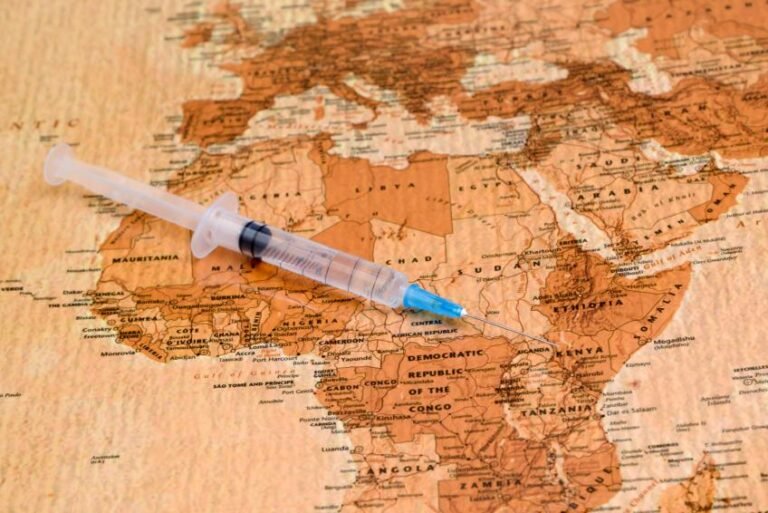The WHO and Big Pharma Rejected by Tanzania: President John Magufuli Says COVID-19 Vaccines Are “Dangerous and Unnecessary”
Copyright © Timothy Alexander Guzman, Global Research, 2021Timothy Alexander Guzman writes on his blog site, Silent Crow News, where this article was originally published. He is a frequent contributor to Global Research.
Featured image is from SCN
All Global Research articles can be read in 27 languages by activating the “Translate Website” drop down menu on the top banner of our home page (Desktop version).
***
There is a glimmer of hope in Africa in regards to the Covid-19 world-wide pandemic where there are no lockdowns, no mandatory facemasks and no required vaccines. Tanzania’s President John Magufuli has reportedly rejected the dictates of the World Health Organization (WHO) and Big Pharma’s experimental Covid-19 vaccines. On January 27th, President Magufuli spoke at a ceremony on the opening of a public forest in Chato in the Geita Region in Tanzania and said that “The ministry of health should be careful, they should not hurry to try these vaccines without doing research, not every vaccine is important to us, we should be careful.
We should not be used as ‘guinea pigs.” Mainstream networks including the BBC and The New York Times has criticized Magufuli since that speech, including the BBC who published a scathing criticism of Magufuli’s government response to the pandemic, ‘Coronavirus in Tanzania: The country that’s rejecting the vaccine’ begins with the story of Peter (of course the BBC says it’s not his real name)who allegedly died of Covid-19 with no evidence from the network, I guess we have to take their word for it, but they did claim he had “a dry cough and a loss of taste”:
For months Tanzania’s government has insisted the country was free from Covid-19 – so there are no plans for vaccination. The BBC’s Dickens Olewe has spoken to one family mourning the death of a husband and father suspected of having had the disease. The fear is that amid the denial, there are many more unacknowledged victims of this highly contagious virus.
A week after Peter – not his real name – arrived home from work with a dry cough and loss of taste, he was taken to hospital, where he died within hours. He had not been tested for Covid. But then, according to Tanzania’s government, which has not published data on the coronavirus for months, the country is “Covid-19-free”
The BBC accuses Magufuli of claiming that the vaccines are dangerous without scientific-based evidence,
“Mr Magufuli has also warned – without providing any evidence – that Covid-19 vaccines could be harmful and has instead been urging Tanzanians to use steam inhalation and herbal medicines, neither of which have been approved by the World Health Organization (WHO) as treatments.”
The BBC was unsure on why Magufuli is extremely critical of the vaccines, and that he “has expressed such scepticism about the vaccines but he recently said that Tanzanians should not be used as “guinea pigs.” Technically, the US Food & Drug Administration’s (FDA) own website under ‘Investigational New Drug (IND) Application’, beginning with their introduction, it stated the following:
Current Federal law requires that a drug be the subject of an approved marketing application before it is transported or distributed across state lines. Because a sponsor will probably want to ship the investigational drug to clinical investigators in many states, it must seek an exemption from that legal requirement. The IND is the means through which the sponsor technically obtains this exemption from the FDA
They list ‘the investigator, emergency use or treatment IND types, both Pfizer-BioNTech and the Moderna vaccines are under the guidelines of the Emergency Use Authorization which is significant under these circumstances which “allows the FDA to authorize use of an experimental drug in an emergency situation that does not allow time for submission of an IND” and ”
“The WHO disagrees” with Magufuli’s assessment, quoting the organization’s Africa director, Dr Matshidiso Moeti who said that “Vaccines work and I encourage the [Tanzanian] government to prepare for a Covid vaccination campaign” that was to be sponsored by the WHO.
The New York Times also criticized Magufuli’s government ‘Tanzania’s president says ‘vaccines don’t work,’ earning a rebuff from the W.H.O.’ claiming that
“President John Magufuli of Tanzania, speaking to a large, unmasked crowd in the country’s northwest on Wednesday, questioned the efficacy of vaccines and discouraged the Ministry of Health from pursuing doses, saying the shots were not “beneficial” to the East African nation.”
Magufuli, a proud African man had mentioned several diseases that are still around today despite all of the advanced technologies from what he called the white man, which he really meant Western nations:
“Vaccines don’t work,” Mr. Magufuli, 61, said in his speech.
“If the white man was able to come up with vaccinations, then vaccines for AIDS would have been brought. Vaccines for tuberculosis would have made it a thing of the past. Vaccines for malaria would have been found. Vaccines for cancer would have been found”
The New York Times continued its attack “On Wednesday, he warned Tanzanians about being used as “guinea pigs” in the vaccine rollout, asked them to eat well and pray to God, and said that they need not expect any restrictions from his government” He continued “I do not expect to announce a lockdown even for one day because our God is living, and he will continue to protect Tanzanians.”
Ok, so he used a little religion in the fight against Covid-19, but he also talked about other remedies, not saying that if they will work or not, but the point here is that Magufuli had raised a number of valid issues. However, The New York Times managed to get political by accusing Magufuli of election fraud and crackdowns on the opposition and the social media:
Mr. Magufuli was re-elected to a second, five-year term in October in a vote marred by accusations of widespread fraud, a clampdown on the opposition and social media restrictions
The internal politics of Tanzania is complex. There is an opposition committed to replacing Magufuli, but there is a majority of the people who are willing to give him a chance. Interestingly, Magufuli is not seen as a dictator according to an independent East African initiative called Twaweza who authored a study called ‘Democracy, Dictatorship and Demonstrations: What Do Citizens Really Think?’ found that only 11% of the people surveyed believed that Tanzania is led by a dictatorship while 58% who believe that the country is not:
Some politicians and elites have described President Magufuli as a dictator, and the word is included in the name, UKUTA. One in ten citizens (11%) agree with the idea that Tanzania is currently being led by a dictator, while six in ten disagree. Three in ten say they are unsure
In the survey’s conclusion, to the majority of the population, Magufuli is not viewed as a dictator regardless of what the western mainstream-media says, however, it is fair to say that if Magufuli were to impose undemocratic restrictions on the country, it would be an unpopular move that would change the course of the Tanzanian government:
One in six citizens is aware of UKUTA, and among them, one in five support the movement. Further, among those who had heard of the movement, understanding of UKUTA was strong. These are significant achievements for an idea and a movement that did not exist in June 2016. Nevertheless, the majority of Tanzanians do not agree with the opposition parties’ description of President Magufuli as a dictator.
For the opposition, these findings are a concrete demonstration of the challenge of mobilising a movement against a government that, despite various measures that could be described as anti-democratic, remains popular with the general public. Across a number of issues surveyed here, there is a marked difference between responses given by supporters of ruling party and supporters of opposition parties.
For the government, the strong support shown here for multiparty democracy and freedom of speech is noteworthy. Though the majority of Tanzanians do not currently agree that President Magufuli is a dictator, this survey shows that further moves to restrict democratic space and undermine the freedom of speech and assembly will be unpopular
Since the start of the Covid-19 pandemic, Magufulihas exposed the RT-PCR testing kits as fraudulentand the mass hysteria of the virus as an over-exaggeration. Despite the internal political problems Tanzania faces, it has resisted the fascist global establishment behind Western-backed institutions such as the WHO and Big Pharma that demands countries to lockdown their populations, enforce facemasks in public and push experimental vaccines that can either injure or kill you. There is evidence around the world that the Covid-19 vaccines are dangerous. In the US alone, the Vaccine Adverse Event Reporting System(VAERS) listed more than 501 deaths with 10,748 other injuries from the Covid-19 vaccines. On record, there has been numerous deaths and injuries around the world from various types of vaccines. At least Magufuli is doing something right, and that in itself is given people around the world some form of hope that humanity is starting to resist a tyrannical world government under the guise of curing a disease.
*
Note to readers: Please Forward this article to your email lists. Crosspost on your blog site, internet forums. etc.
About the author:
Timothy Alexander Guzman is an independent researcher and writer with a focus on political, economic, media and historical spheres. He has been published in Global Research, The Progressive Mind, European Union Examiner, News Beacon Ireland, WhatReallyHappened.com, EIN News and a number of other alternative news sites. He is a graduate of Hunter College in New York City.
Disclaimer: The contents of this article are of sole responsibility of the author(s). The Centre for Research on Globalization will not be responsible for any inaccurate or incorrect statement in this article. The Centre of Research on Globalization grants permission to cross-post Global Research articles on community internet sites as long the source and copyright are acknowledged together with a hyperlink to the original Global Research article. For publication of Global Research articles in print or other forms including commercial internet sites, contact: publications@globalresearch.ca
www.globalresearch.ca contains copyrighted material the use of which has not always been specifically authorized by the copyright owner. We are making such material available to our readers under the provisions of “fair use” in an effort to advance a better understanding of political, economic and social issues. The material on this site is distributed without profit to those who have expressed a prior interest in receiving it for research and educational purposes. If you wish to use copyrighted material for purposes other than “fair use” you must request permission from the copyright owner.
For media inquiries: publications@globalresearch.ca

Come Follow Us on Twitter – Come Like Us on Facebook
Check us out on Instagram – And Sign Up for our Newsletter




 www.globalresearch.ca
www.globalresearch.ca






